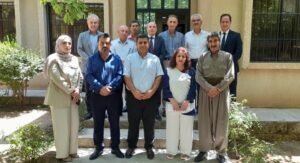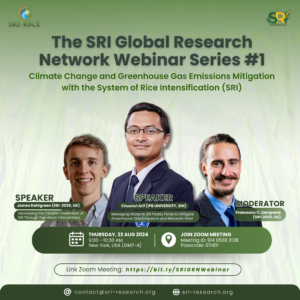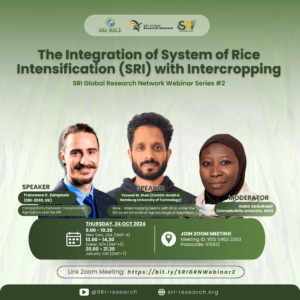On July 10, 2025, the SRI Global Research Network hosted the fifth session in its webinar series, titled “Integrated Assessments for Mitigation and Adaptation Co-Benefits and Trade-Offs: A Rice Case Study.” The featured speaker was Sonali Shukla McDermid, Associate Professor at New York University, and the session was moderated by James Dahlgreen of SRI-2030, UK.
In her talk, Sonali Shukla McDermid presented research that uses integrated modeling to assess the combined climate and socioeconomic impacts of rice farming practices. Focusing on System of Rice Intensification (SRI) and Alternate Wetting and Drying (AWD), she shared findings from studies in Bangladesh, Vietnam, and India. Her team applied climate, crop, and economic models that were calibrated with real-world field and household data. The goal was to understand how these practices perform not only under current conditions but also under future climate change scenarios.
The results showed that SRI consistently outperforms conventional methods in terms of yield, methane emission reduction, and water use efficiency. AWD also offered environmental benefits but had more limited productivity gains. Even under more extreme climate scenarios, SRI maintained better performance than conventional approaches, indicating its potential for long-term resilience. The modeling also helped explore how these benefits vary across different types of farmers, highlighting that both smallholders and larger-scale farmers could experience meaningful improvements in farm income and reduced climate vulnerability if they adopt SRI practices. She emphasized that the research does not assume a perfect implementation of SRI. The modeling captures the diversity of how farmers adopt different principles based on their own conditions, allowing for a more realistic assessment of outcomes. The team also looked at what happens when farmers shift from conventional to improved practices, showing that even partial adoption can lead to significant gains.
The discussion following the presentation touched on broader questions about economic modeling, the nature of win-win outcomes in sustainable agriculture, and the challenges of translating modeling results into real-world policy. McDermid and her collaborator Roberto Valdivia spoke about the importance of recognizing on-the-ground diversity and the need for tools that go beyond simple cost-benefit analysis. The session closed with reflections on how this kind of integrated research can support national climate and agricultural goals, especially in countries already working to include SRI-related practices in their policy planning.
James Dahlgreen, who moderated the session helping guide the discussion toward the practical implications of McDermid’s research. He emphasized the importance of bridging academic findings with real-world implementation and raised thoughtful questions around scalability, policy relevance, and farmer-level impact.
For those who were unable to attend the live session, the full recording is available on YouTube and can be accessed below. Stay updated on future events and publications by subscribing to our newsletter at sri-research.org.


